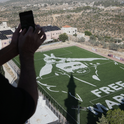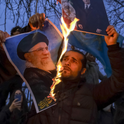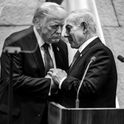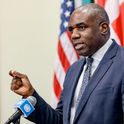The day that hundreds of Palestinians and Israelis were due to meet in Paris to talk about how to end the Gaza war and revive the two-state solution was also the day that Israel started a war with Iran.
Overnight on Thursday, Israeli war planes had launched strikes on nuclear facilities and military sites, killing nuclear scientists and senior Iranian Revolutionary Guard commanders. Benjamin Netanyahu, who has spent years singularly focused on the Iranian threat, had waited for this moment practically his entire political career.
On Friday morning, the mostly Israeli and Palestinian participants gathered in the too-hot Economic, Social and Environmental Council building in Paris, as the Israeli attack on Iran—codenamed “Operation Rising Lion”—was well underway. This meeting of civil society organisations was meant to feed into a high-level two-state solution conference scheduled in New York on 17th June, led by French President Emmanuel Macron and Saudi Crown Prince Mohammad bin Salman.
Throughout the day, as the reality of Israel’s attack on Iran became clearer, rumours swirled that Macron would cancel the following week’s summit, and many participants found themselves suddenly busy with working out how they would get home. It looked like all flights to Israel would be cancelled for the foreseeable future.
The participants in Paris were veterans of peacebuilding initiatives, politicians and former politicians and military generals. There were familiar faces of left-wing Israeli lawmakers and former Palestinian ministers. Many had met before at similar initiatives, committed to two states, to normalisation, to compromise, but only behind closed doors. Billed as including Palestinians from Gaza, the event almost fell apart, one of the organisers told me, when dozens of Palestinians displaced from the Strip who were meant to attend were unable to get visas to travel to France. “All have one thing in common,” the organisers had stated ahead of Friday’s conference: “a commitment to peace and the courage to stand together—publicly”.
For weeks, some international momentum had been building regarding Israel’s violence against the Palestinians in Gaza. The UK had announced sanctions against two Israeli government ministers. Even Chancellor Merz had, unusually for Germany, expressed clear criticism of Israel’s actions and intentions in the Strip. Speculation over whether France would join a series of other countries who in recent months have recognised a Palestinian state was rife. Palestinian Authority President Mahmoud Abbas had written a letter to Macron and bin Salman pledging internal reform and calling for the disarmament of Hamas and for the presence of international forces in Gaza. It seemed like a moment, perhaps, for actual action to stop the bloody status quo.
But as the Israeli attack on Iran continued, and amid tensions over when and how Tehran would retaliate, the light of global attention shifted from the war crimes, ethnic cleansing and starvation in Gaza to the fast-growing likelihood of a region-wide Israel-Iran war. Gaza had been relegated to a sub-plot, the main event being the Israeli prime minister’s fever dream.
Sweltering with no air conditioning, among the participants there was a sense of urgency—“enough talk”, said an audience member in a panel on cooperation between Israeli and Palestinian citizens. But also of resignation and regret. How could it be that, after so many years of trying, we find ourselves here? And what did it mean to talk about long-term peace or two states even when, as Fakhira Halloun, a senior researcher with A Land for All, the movement for a two-state confederation, put it “we are operating in a genocide war”?
But what of talking about peace between Israelis and Palestinians at the outset of an Israel-Iran war? Alon-Lee Green, the co-director of Standing Together, an Israeli-Palestinian movement that has been leading marches from Tel Aviv to the Gaza border, told me that these two things are very obviously connected. “The only question we should ask is if we will live in war or in peace. If you want to live in war then there will always be a forever war, and the [fighting] will move from one front to the other. The main thing is not to make peace. That's the strategy of the state of Israel.”
Green and his Palestinian co-director, Rula Daood, speak unflinchingly about Israel’s actions in Gaza. It’s a “war of elimination”, he says. “We are using these words, we are declaring these intentions, and the reality matches these declarations”.
But at the same time, Green believes their movement has helped open up a space for opposition to the war. Since the ceasefire fell apart in March, more Israelis are demanding an end, and not only to free the hostages still held by Hamas in Gaza, but “because we are hurting innocent people.” The Paris conference was taking place in the 20th month of the war. A year ago, he said, the situation was too tense, too explosive for Israelis and Palestinians to take the position publicly that conference members were taking.
Ahead of the Paris event, there were some doubts that France would go ahead and recognise a Palestinian state in New York. On the day itself, Macron’s special envoy for the Israeli-Palestinian peace process, Ofer Bronchtein, said, tellingly, that France would recognise a Palestinian state “soon”.
A call to action, the outcome of the day’s discussion outlined five moral imperatives, intended to feed into the French-Saudi two-state initiative: to end the war and secure regional and international leadership on rebuilding and governance of Gaza; to realise a “comprehensive political and security framework for the Middle East region”; to support the two-state solution at home, which “starts with recognition of Palestinian statehood”; to establish an international fund for peace and protect civil society; and to invest in a “new narrative and in rising generations”.
Best laid plans. The French president, who had been due to address the closing session of the Paris conference, sent the foreign minister instead, and invited all the participants to meet him at the Elysée Palace. In the sunny garden, he confirmed that, given the new war unfolding in the Middle East, the two-state solution conference in New York had officially been cancelled. “We are completely aligned to reorganise it as soon as we can,” he said, “and I want to be clear: we should not postpone it too late”.
At the time of writing, Israeli strikes on Iran and Tehran’s retaliation are in their fifth day. The damage in Israel has been unprecedented, with Iranian drones and ballistic missiles killing 14 people and injuring hundreds across the country, destroying buildings. In Iran, the authorities say that more than 220 people have been killed, with the Israeli army reporting that it has struck hundreds of military “targets” and “assets”. Amid palpable Israeli euphoria over the operation, alongside fear of Iran’s missiles, some experts doubt that Israel could remove the Iranian nuclear threat militarily. Others doubt there is a way out of what could easily become a war of attrition, in which innocent civilians pay with their lives. Israel seems to be banking on US involvement beyond defence support.
With the world’s focus now on Iran, powers in Europe who had grown increasingly critical of Israel over Gaza were suddenly broadly supportive of its actions against Iran. Macron told reporters Paris on Friday that, though France may not think that “military action is necessary... the strikes diminished Iran’s uranium enrichment capabilities and its ballistic capacity. Their outcome aligns with our strategic direction. Now we must return to negotiations.”
And the war in Gaza is not over. On Saturday Israel declared it a “secondary” front. Over the weekend, Palestinians reported an increase in Israeli activity. On Sunday, Hamas’s health ministry said that 29 Palestinians had been killed and 380 wounded in 24 hours near aid hubs operated by a new US-backed aid foundation. Closing the conference, a young woman displaced from Gaza made an impassioned plea: “Don’t let Gaza bleed in silence.”
This article has been amended to clarify that the minister sent in Macron's place was France's foreign minister













